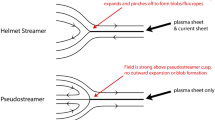Abstract
In rotating stellar convective zones, heat transfer is shown to be associated with unbalanced azimuth forces arising in the radially ascending (heated) or descending (cold) matter. The presence of a longitude-dependent magnetic field generates additional azimuth forces, hence, new ways of compensating for the unbalanced forces. Generally speaking, this magnetic field is variable but may be nearly static in layers where convective equilibrium is replaced by radiative equilibrium. The condition for the coexistence of the static and usual fields is derived. To this end, an axisymmetric azimuth magnetic field of energy comparable to the energy of rotation should be introduced into models under consideration. In such configurations, conditions for magnetic field generation, as in the Sun, may appear.
Similar content being viewed by others
References
E. N. Parker, Cosmical Magnetic Fields (Clarendon, Oxford, 1979; Mir, Moscow, 1982).
Yu. V. Vandakurov, Pis’ma Astron. Zh. 25, 868 (1999) [Astron. Lett. 25, 758 (1999)].
Yu. V. Vandakurov, Pis’ma Astron. Zh. 28, 633 (2002) [Astron. Lett. 28, 560 (2002)].
H. C. Spruit, Sol. Phys. 34, 277 (1974).
D. A. Varshalovich, A. N. Moskalev, and V. K. Khersonskii, Quantum Theory of Angular Momentum (Nauka, Leningrad, 1975; World Sci., Singapore, 1988).
Yu. V. Vandakurov, Astron. Zh. 76, 29 (1999) [Astron. Rep. 43, 24 (1999)].
Yu. V. Vandakurov, Astron. Zh. 78, 253 (2001) [Astron. Rep. 45, 216 (2001)].
Yu. V. Vandakurov, Pis’ma Astron. Zh. 25, 143 (1999) [Astron. Lett. 25, 111 (1999)].
Yu. V. Vandakurov, Zh. Tekh. Fiz. 71(6), 1 (2001) [Tech. Phys. 46, 645 (2001)].
Yu. V. Vandakurov, Astron. Zh. 74, 115 (1997) [Astron. Rep. 41, 106 (1997)].
Yu. V. Vandakurov, Pis’ma Astron. Zh. 27, 700 (2001) [Astron. Lett. 27, 596 (2001)].
Yu. V. Vandakurov, Izv. Vyssh. Uchebn. Zaved. Radiofiz. 44, 735 (2001) [Radiophys. Quantum Electron. 44, 678 (2001)].
J. Schou, H. M. Antia, S. Basu, et al., Astrophys. J. 505, 390 (1998).
R. Howe, J. Christensen-Dalsgaard, F. Hill, et al., Science 287, 2456 (2000).
Yu. V. Vandakurov, Pis’ma Zh. Tekh. Fiz. 27(18), 29 (2001) [Tech. Phys. Lett. 27, 769 (2001)].
Author information
Authors and Affiliations
Additional information
__________
Translated from Zhurnal Tekhnichesko\(\overset{\lower0.5em\hbox{$\smash{\scriptscriptstyle\smile}$}}{l}\) Fiziki, Vol. 73, No. 3, 2003, pp. 23–27.
Original Russian Text Copyright © 2003 by Vandakurov.
Rights and permissions
About this article
Cite this article
Vandakurov, Y.V. On the effect of longitude-dependent fields on convection in stellar atmospheres. Tech. Phys. 48, 298–302 (2003). https://doi.org/10.1134/1.1562257
Received:
Issue Date:
DOI: https://doi.org/10.1134/1.1562257




